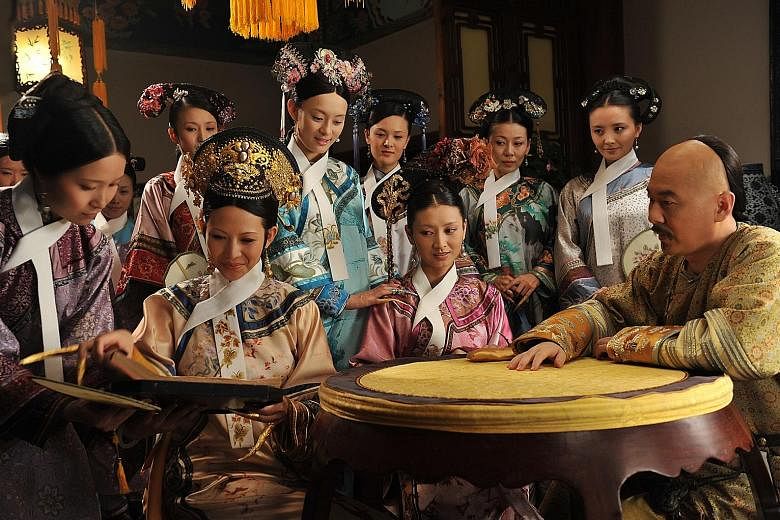Viewers in Singapore may have heard of the latest drama sensation from China, which has garnered billions of views online with its scenes of peach blossoms, immortals and romance across lifetimes.
Eternal Love, better known in Chinese as Sansheng Sanshi Shili Taohua, was actually adapted from an online novel.
In China, online novels have become big business, drawing investors and interest from China's biggest tech companies.
"Online novels can be considered the biggest source of IP in the (Chinese) market today. They sit on the very top of the upstream of the entire pan-entertainment industry chain, said analyst Jing Ruyi at iResearch Consulting, a Chinese Internet market research firm. IP, or intellectual property, is used in China to refer to original content.
Just last week, China Literature, the online e-book arm of technology giant Tencent, went public in Hong Kong, in the biggest tech listing in the territory in 10 years. It raised a whopping HK$8.3 billion (S$1.5 billion), and its shares now trade at around HK$100 apiece, giving it a market value of HK$90 billion.
In China, more than 330 million people - or about one in four Chinese - read online novels spanning genres such as fantasy, swordfighting, tomb-raiding and time travel.
"Reading online novels is like eating fast food. It gives me quick and instant gratification," said university student Feng Linrui, 21, who spends between 20 yuan (S$4) and 50 yuan a month paying for VIP subscriptions to online novel portals.
-
Valuable works
-
The top 10 online authors in China have created franchises worth one billion yuan (S$205 million) each, according to a ranking of the most valuable creative works intellectual property (IP) this year.
Data such as online readership, fan numbers and how often a work had been recommended were crunched by China-based Hurun Research Institute and IP management agency Mopian, to compile a list of the 100 most valuable creative works IP in China over the past 20 years.
The initial findings were supplemented with a second round of assessment where researchers and industry experts awarded additional points based on a work's social impact and literary value.
Top of the list is Fights Break Sphere (Doupo Cangqiong), a sword-fighting fantasy written by 27-year-old Tiancan Tudou between 2010 and 2013. It has an online readership of around 10 billion views. The first season of its animation series has garnered more than a billion views online. TV, movie and video-game versions are due out in the next two years.
Second is Grave Robbers' Chronicles (Daomu Biji), a tomb adventure novel by Nanpai Sanshu, who began serialising the work on the Qidian China website in 2006. The long-running series was published in nine volumes between 2007 and 2011, and sold a total of 12 million copies. It was spun off into an online TV series in 2015, averaging nearly 400 million views an episode. Its movie version hit the screens last year and raked in one billion yuan in box-office earnings.
Historical fiction Nirvana In Fire (Lang Ya Bang) by Haiyan ranks fifth. It started its run on Qidian China in 2006, and had 4.8 million views. The 2015 TV adaptation had an average of 260 million views an episode online.
Empresses In The Palace (Zhenhuan Zhuan), a novel on imperial harem intrigues, is sixth. Its TV drama in 2011 scored an average viewership of 130 million views an episode. It was also acquired by streaming company Netflix for the American market in 2015.
Chong Koh Ping
She also spends several hundred yuan on tipping her favourite writers by giving them virtual gifts or buying printed versions of their books.
Her spending has contributed to the growing online literature market, which has expanded by more than 20 per cent every year since 2012 to reach US$1.3 billion (S$1.8 billion) last year, according to the authorities.
For sure, online novels have been around in China for a long time.
Budding authors will register with online novel portals and publish their stories for free. After they become popular, they could sign contracts with the portals to start charging readers a fee of three to five fen per one thousand words to read their content. The successful ones would go on to get their stories published as books.
For about a decade, this was how authors and these online portals made money.
But a few years ago, the entertainment industry discovered that adapting popular online novels into TV dramas and movies could be a short-cut to producing instant hits.
This gave birth to a whole new industry surrounding online novel IPs, which extends to games, comics, merchandise and offline stores.
Jinjiang Literature City, one of China's pioneer online novel portals, told The Straits Times that besides collecting fees from readers, it counts selling foreign publishing rights, online rights and working with entertainment companies on spin-offs as other key ways in which it makes money.
In the case of Eternal Love, it was based on a 2008 online novel by a Sichuan author known by her Web name Tang Qi. Though it was well known among online readers, it gained mainstream popularity only after the TV version was aired earlier this year.
The show, which stars Taiwanese actor Mark Chao and Chinese actress Yang Mi, became one of the most viewed Chinese dramas, with over 35 billion online views. The theme song topped music charts and the story was adapted for a movie and mobile game.
Ms Tang, 32, told The Straits Times that she sold the TV, movie and game rights to three different companies three years ago, when the trend started to pick up. Previously, her online novels made it only to print.
She said she has no interest in exploring further spin-offs of her popular novel. "At the heart of it, I'm an author, this falls outside my area of concern," she said.
The lucrativeness of online novels has also attracted the attention of China's tech giants.
Other than Tencent, which claims nearly half of the market with China Literature's 6.4 million authors and 9.6 million works, Alibaba and Baidu are also in the race to come up with China's Harry Potter. J.K. Rowling's fantasy novel series has created an empire worth about US$25 billion in the form of movies, theme parks and merchandise.
Many budding Chinese authors dream of hitting the jackpot with their online works.
"My immediate goal is to put my new novel on a bigger website, and of course the long-term goal is to have my works adapted into TV dramas and movies," said risk manager Zhang Xiaomao, 34, who has been serialising a swordfighting fantasy novel online since 2015.
"Since the critically acclaimed reception of TV serials like Empresses In The Palace and Nirvana In Fire, things are looking up for the online literature genre. People no longer feel that online novels are too shallow. I want to ride this wave of popularity to try to make a name for myself."



